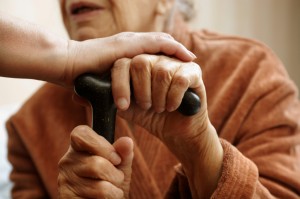They're heading to the hospital to get help and become among the first to enroll in UCLA’s Alzheimer’s and Dementia Care Program. Funded by philanthropic dollars and a federal innovations grant, the program is designed to help patients and family caregivers deal with dementia.
Linda says she welcomes any assistance offered by the program. For more than a decade, she's played the lead role in caring for her mother. While a full-time caregiver now assists her mother, Linda's days nevertheless remain consumed by providing care for her mom — with her remaining time spent with her husband or on her career as voice actress and audiobook narrator.
“I have no free time," she says. "No free time. You know how people say, 'One day at a time'? A day is way too long. I take it an hour at a time. Sometimes, just this moment at a time.”
That’s a refrain shared by many who care for people with Alzheimer's and dementia. In California, more than 500,000 people are now afflicted with Alzheimer's alone. By 2030, that number is expected to climb to 1.1 million, according to statewide projections. Experts say that will place an even larger strain on family caregivers.
“The most important resource that a person with Alzheimer’s disease or other dementia has is their caregiver — much more important than their doctors," says Dr. David Reuben, chief of UCLA Geriatric Medicine and head of the new dementia program, which is offering enrollment to all medical center patients diagnosed with dementia. Those who participate will get an individualized care program tailored both for them and for their caregiver.
"We see a lot of caregiver burnout," Reuben says. "Once the burnout has happened, it’s almost impossible to try to retrieve people. That means a lot is riding on these caregivers, and they have to be supported."
In addition to providing coordinated medical care for patients, the program is offering caregivers around-the-clock access to geriatric experts for help with sudden behavior changes and other unique challenges posed by dementia.
The program also features caregiver support groups, called Beyond Alzheimer's that are organized by Patti Davis.
Davis is the daughter of former president Ronald Reagan — one of the world’s most famous Alzheimer’s patients. She says support groups are especially important for family members dealing with Alzheimer's disease and other dementia because they affect families unlike any other disease.
"It’s a death before dying," Davis says. "You’re losing everything that is familiar about that person in stages that are very unpredictable and you have no idea what’s going be lost next or when. You only know that it will happen."
That’s a pretty accurate depiction of the journey Linda Kerr has traveled with her mother since 2001. The several strokes Martha has suffered have changed her personality and require medication to quell episodes of belligerence. But the drugs sometimes affect Martha’s coordination, as happened on a recent outing that Linda says devolved from a fun experience into another exhausting episode.
“It was like she had another major stroke," says Linda. "Her brain went dead; she couldn’t walk right. She almost fell on us, and she still gets agitated.”
Martha’s drug prescriptions were among the topics of discussion at her dementia care enrollment meeting, which began with a medical technician checking her vital signs.
The female tech started by explaining to Martha everything she was doing. “I need one finger in here. It’s for your oxygen and pulse, OK?" she said as she held up the finger-mounted pulse oximeter. She then checked Martha's weight.
The brief physical was followed by an assessment meeting between the Kerrs and geriatric nurse practitioner Leslie Evertson, who manages the dementia care program.
“The first thing I do is get a good overview picture of what’s going on with Ms. Kerr and the family and try to narrow down some goals that we can hope to attain — what would make their quality of life easier," she says.
After about an hour, the Kerrs left the closed-door meeting with Martha enrolled in the program and with a prescription for Linda as well: to attend a support group. But the time constraints imposed by her mother’s illness right now make that step unlikely, she says.
“I wish I had more time to go," Linda says. "If I have a day, I’m here with my mom giving the caregiver a break. So I have to choose, you know, it’s like it’s better off I’m here.”
That sentiment underscores a paradox that may likely pose one of the biggest challenges for the UCLA program as it expands into what organizers hope will be a model for dementia care nationwide.
